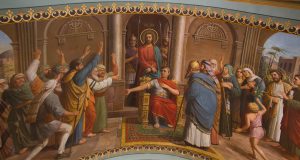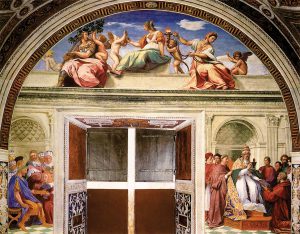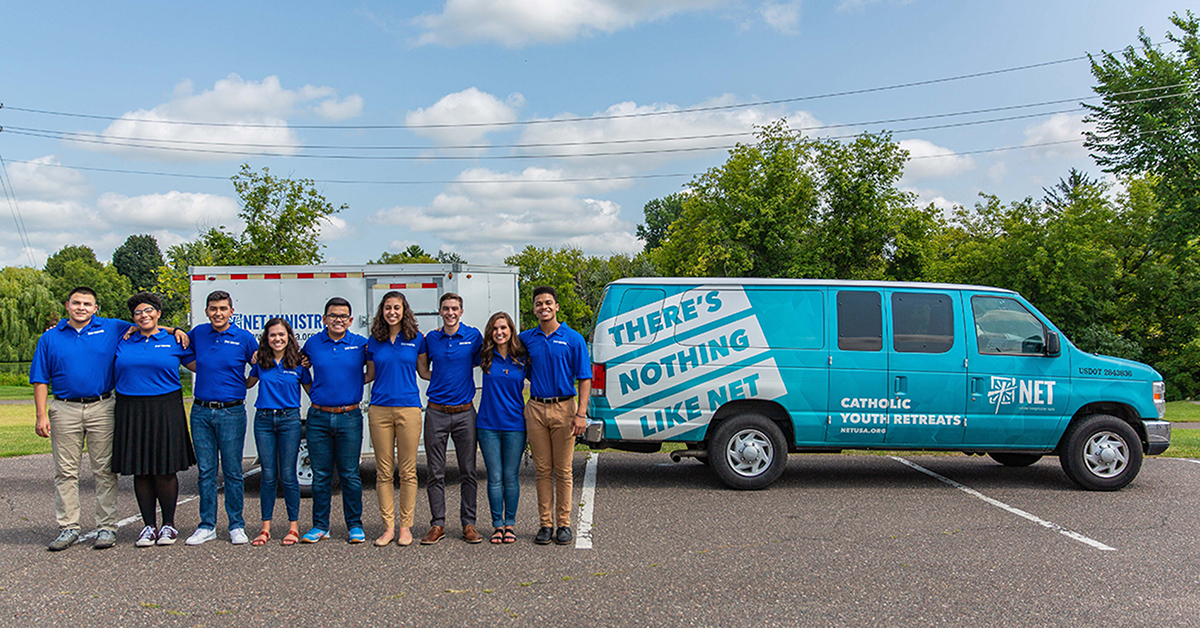
By Renae Kranz
Catholic parents and parishes want the same thing: vibrant young people on fire for Christ. This common goal is difficult to attain but so necessary to keep our Catholic faith thriving and growing.
We already have several diocesan programs like Going Deeper Retreats, Confirmation Retreats, D-Camps, Totus Tuus and Bible studies. But to have a lasting impact on young people, more evangelization needs to happen at the parish level.
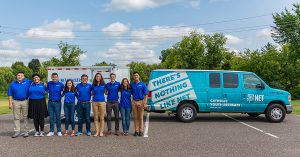 So how do we do that with many small, rural parishes? We bring in a NET Ministries team to light the fire of missionary discipleship.
So how do we do that with many small, rural parishes? We bring in a NET Ministries team to light the fire of missionary discipleship.
In light of the vision Bishop DeGrood has sensed from God for the diocese for lifelong Catholic missionary discipleship through God’s love, the bishop and the diocesan Discipleship and Evangelization Office want to help parishes develop on-fire youth this year. A great opportunity has arisen in partnership with NET Ministries to dedicate a NET discipleship team in our diocese for the year.
It’s a unique and exciting opportunity.
Bringing the fire to our diocese
NET (National Evangelization Teams) Ministries will be familiar to some in our diocese. They’ve been doing retreats here since their inception in 1981. They have now grown from their main office based in the Archdiocese of St. Paul and Minneapolis to serve dioceses not only in the United States, but also in other countries including Canada, Australia and Ireland.
NET teams are made up of four men and four women who usually do one of two types of ministry aimed at junior high and high school students: teams either travel around putting on retreats, or teams do discipleship outreach work in schools or parishes for a year. One of these experiences is probably what some of us are familiar with when we think of NET.
 This year they’re trying something new in the Sioux Falls diocese. After sensing in prayer a need in our diocese, Bishop DeGrood asked NET to send a team here to do a hybrid ministry. They’ll be dedicated to our diocese from September 18 to May 9 and will travel to four or five designated “hubs” around the diocese for five to six weeks each. The diocesan Discipleship and Evangelization team (including Father Scott Traynor, Eric Gallagher, Dr. Chris Burgwald and Emily Leedom) will be working with parishes to coordinate the NET team’s schedule.
This year they’re trying something new in the Sioux Falls diocese. After sensing in prayer a need in our diocese, Bishop DeGrood asked NET to send a team here to do a hybrid ministry. They’ll be dedicated to our diocese from September 18 to May 9 and will travel to four or five designated “hubs” around the diocese for five to six weeks each. The diocesan Discipleship and Evangelization team (including Father Scott Traynor, Eric Gallagher, Dr. Chris Burgwald and Emily Leedom) will be working with parishes to coordinate the NET team’s schedule.
Father Traynor, vicar for lay and clergy formation, says the idea behind the hybrid setup is especially to help parishes who may not have a youth minister or other paid staff to work with their youth. The NET team will be able to provide outreach in a meaningful way, starting with their basic retreat where they invite junior and senior high school students to open their hearts to the fire of God’s love.
But Father Traynor doesn’t want this to just be a one-time thing and then send them off on their own with a “good luck.” The NET team will be working to connect young people with follow-up resources in their parish and in the diocese.
“We want to leverage the great gift of the NET team’s presence here to be a bridge to what we have already in the diocese,” Father Traynor says. “We have a lot of young adults in our parishes, college age and older, who have come through discipleship camp over the years, who have been Totus Tuus missionaries, who are focus alumni or NET alumni, and this gives us an occasion to organize them to be able to do discipleship groups in local areas. We really hope that the experience of the NET retreat and the presence of the NET team in a region will build those connections with those adults who can continue to invest in those young people in discipleship.”
For those who might be interested in helping to disciple those young people after the NET team is gone, they can feel confident in what they’re doing because of their time working with the NET team and learning from them. It’s a win-win situation for the entire diocese.
“Having the NET team here allows us to try that on and see what that could look like and what we could accomplish,” Father Traynor says. “So it’s going to be a lot of creative and innovative outreach, and it would be my goal and Eric’s goal to definitely see if we can have, in two or three years, a diocesan-based team that’s available to these parishes in the same way.”
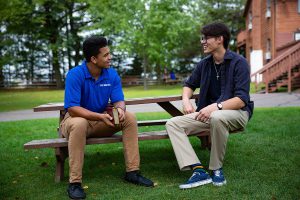 For smaller, more rural parishes, this offers a way for them to feel more connected to diocesan initiatives and receive the benefits of them more directly. It’s all part of Bishop DeGrood’s plan for the diocese—a jumpstart toward Catholic missionary discipleship.
For smaller, more rural parishes, this offers a way for them to feel more connected to diocesan initiatives and receive the benefits of them more directly. It’s all part of Bishop DeGrood’s plan for the diocese—a jumpstart toward Catholic missionary discipleship.
“The aim in Catholic missionary discipleship is to meet any person where they are and help them take the next best step they can take to grow in relationship with Jesus and His Church,” Father Traynor says.
Once the initial investment of time with the NET team is completed for each region, the aim is to invite those junior and senior high students and the adults wishing to get involved to connect with their parishes and with other diocesan programs to create a pathway to continue the new awakening of their faith. A big part of Father Traynor’s role is to help parishes be the place where people can be accompanied and grow deeper in their relationship with God at the parish level.
The NET team’s presence in an area will help Fr. Traynor and the rest of the diocesan Discipleship and Evangelization team train adults in how to run small groups and discipleship groups. One example of what Father Traynor hopes to put together from that training would be organizing small-group Bible studies that an adult, now trained and ready, can lead. This initiative should help increase the number of adults who feel comfortable to lead others.
Father Traynor and Bishop DeGrood also want local parishes to think about how they can respond and what steps they could take, with the help of the diocesan offices, to expand that Catholic missionary discipleship vision and carry it on.
Lynn Mayer, discipleship team coordinator for NET Ministries, says she sees a shared vision between NET and our diocese in the way we want to help young people encounter the love of Jesus and “to create disciples who are then ready to be on mission and serve the Church.” She says this model could be one they eventually replicate in other areas of the country.
Mayer and Mark Berchem, founder and president of NET, couldn’t pass up on the idea when Bishop DeGrood reached out and pitched it to them. Mayer says the Holy Spirit took over and the pieces began to fall into place. The fact that our diocese already has some experience with a somewhat similar model helped the vision come together. NET is excited about the opportunity to try something new.
“This feels like a real partnership between the Sioux Falls diocese and NET which is such a gift when you are trying something new,” Mayer says. “So much of our time has been adjusting and planning for the ministry year in the midst of a worldwide pandemic, it has been great for us as a ministry to have opportunities to be talking and making plans that aren’t only COVID related. I am overwhelmed with God’s generosity in offering us the opportunity to try something new and exciting during a time that has been somewhat trying in ministry.”
What kind of results can we expect from this new arrangement with NET? If we make the most of it, the fruits could be far reaching.
Missionary fire produces much fruit
Many levels of fruit can come from a program like this and not only from the work with junior and senior high school students. Father Traynor says the real investment is in the training up of Catholic missionaries to go out and continue the work after the NET team leaves and in connecting youth with existing adult leaders. It will be especially helpful in rural parishes where parents and youth alike can see what is possible in missionary outreach.
“This NET team will have a real eye to inviting parents and other young adults to be involved and to be that follow up after the team moves on,” Father Traynor says. “They can really help interested adults get over the hump. People need to see it in action to imagine that this is really possible.”
In everyday life, younger kids look up to older kids and adults—grade school kids look up to middle school kids, middle school kids look up to high school kids, high school kids look up to college kids. They can act as mentors and bring younger kids up as disciples of Christ. This is the whole idea behind NET ministries and other programs like FOCUS and Totus Tuus.
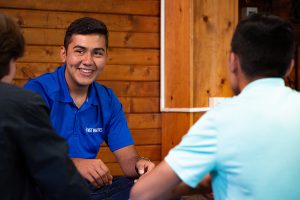 Father Traynor’s own experience of this idea was pivotal in the development of his faith. While in Catholic school as a middle school student, he and his classmates were expected to be responsible for the younger kids who looked up to them. It was a big deal.
Father Traynor’s own experience of this idea was pivotal in the development of his faith. While in Catholic school as a middle school student, he and his classmates were expected to be responsible for the younger kids who looked up to them. It was a big deal.
“There can be a lot of good things that happen just among friendships with direct peers in high school and junior high school, but especially to equip them and give them a defined way, an environment where they can exercise that leadership in an appropriate way for people who are just a little bit younger than them, that’s totally doable,” Father Traynor says. “It’s been done very fruitfully in many places.”
The key to this type of evangelization is that it’s relational. Father Traynor points out that people grow in relationship with God and the Church through influential relationships. He says if evangelization isn’t relational, it isn’t happening. The more people you have working on those relationships who have the tools they need to act on the evangelization vision, the more we will see growth in our parishes and diocese.
Through those relationships and the activities experienced with NET and other adults, we can expect an awakening in faith in our young people and a building and multiplying of the kind of Catholic discipleship relationships happening in the diocese. Jesus becomes real to all of us through each other. We begin to realize He is here for us and can make a difference in our lives.
“That really disposes young people to welcome Jesus into their heart in a way they never have before in their life,” Father Traynor says.
And Father Traynor goes further to say we don’t have to be perfect or know everything in our evangelization efforts. Evangelization is just the sharing of our faith, and the Church, our priests and the diocesan offices are there to help us. All we have to do is be with the people we are normally with and intentionally help them in their faith.
“God has a plan for that person in their life, and He wants to draw them. He’s always laboring to draw them to take the next step deeper in relationship with himself and with the church,” Father Traynor says. “So really banking that God is taking the initiative takes the pressure off for me as an evangelist.”
The NET team will help young people and adults become more comfortable with Catholic evangelization and missionary efforts, but it can be awkward. It becomes easier as you do it and get out of your comfort zone a bit.
Father Traynor says the thing to remember is that the awkwardness is worth it. If we’re to help each other get to heaven, we must face our fear of talking about faith.
“If we really believe that our choices in this life have eternal consequences, eternal union with God and perfect happiness or eternal separation from Him, eternity is worth the awkwardness,” he says.
Once the people reached through the work of NET teams have begun to grow in their relationship with Christ, they will also begin doing the work of a person seeking more in their faith: frequenting the Sacraments, praying, seeking good fellowship and serving others. The next step is to then give as a gift to others what they are receiving from God. They can help others take the next step. It becomes a blessing to all involved and helps their faith develop strong roots that are not easily pulled up.
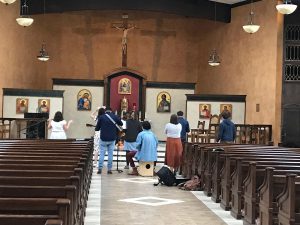 This type of Catholic missionary discipleship helps foster more vocations, build stronger families and keep our Catholic faith growing. It sets the missionary fire of God’s love ablaze.
This type of Catholic missionary discipleship helps foster more vocations, build stronger families and keep our Catholic faith growing. It sets the missionary fire of God’s love ablaze.
“We’re here to equip people who have said a strong yes to Jesus Christ to be built up and equipped to go out and reach their coworkers, their other family members and the people who God brings into their lives to help every person they meet to truly be missionary disciples, to help each person they meet to begin and deepen their own relationship with Jesus Christ,” Father Traynor says.
It’s something he experienced during his own time with NET Ministries.
Former NETer’s stories
Father Traynor was a NET missionary in 1992. At the time, he had become convinced God had a plan for his life, but he didn’t know what it was yet. He just knew if he followed it, he would be the most happy.
The time spent learning more about his faith, praying, working with the other NET team members, going back to confession after many years away, recreation together, and much praise and worship were critical to understanding that plan for his life. The trainers who lived NET every day also helped him and the other team members feel more comfortable with what they were taking on.
“It’s important that someone who’s living it can take you by the hand and not only cast a vision for it, but say, ‘It’s going to be okay,’” Father Traynor explained. “And then to see how powerfully God worked in the lives of these young people as we did our retreats was absolutely a life changing experience.”
Staying with the host families, as all NETers do, made him think God was calling him to the married life. He saw Catholic family life like he had never known and wanted it for himself someday. But God had other plans.
As Father Traynor was traveling through the Diocese of Saginaw (Michigan), praying and asking God to raise up good priests for the amazing families he met, he heard God say something shocking in his heart. He said he wanted him to be His priest.
“Up until that moment, I was really open to whatever God had wanted. And then I was like, I don’t think I’m too open to that,” Father Traynor admitted.
Thankfully, the daily prayer time during his NET experience helped him open his heart to God’s plan. He had very personal conversations with God every day and asked God to give him the desire to be a priest. If God would do that, he would take that path.
Amazing things happened the rest of his year with NET and the desire came. By the time he was done with his year, he couldn’t wait to get to seminary.
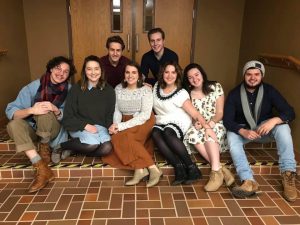
Another NETer, Erin Claussen, a parishioner at St. Lambert Parish in Sioux Falls, spent a year as a NET missionary. Her year was filled with ups and downs and was very demanding. But the Lord doesn’t promise us an easy life. Although it was one of the hardest years of her life, she found great joy as well.
“I would say the best thing about my experience was the people I met, both in the form of other missionaries and those in the community we served,” Claussen said. “I learned to never give up on people, no matter how hard the year got.”
She found the biggest impact on her faith was forming a consistent prayer life. The early morning personal prayer time each day became very important to her, even if she would occasionally fall asleep during prayer. She needed that time with God.
Claussen says NET showed her the importance of reconciling with God and others which impacted her faith as well. God was calling her to enter into relationships with others more deeply. It’s a call worth answering.
NET is coming to you
Father Traynor says there are things we can do to make this year with NET a greater success for the parishes and diocese. When you hear the NET team is coming to your area, tell your friends and invite them along.
The NET teams will also need host families to stay with, so watch for information coming through your parishes for opportunities to help.
It’s up to us to make the NET team’s time here fruitful and to allow the fire of Catholic missionary discipleship to burn brightly throughout the diocese. If you’re hearing a call from God to help, don’t turn away from it. Jump in and help make this the catalyst to a more vibrant Catholic faith community in Eastern South Dakota.

